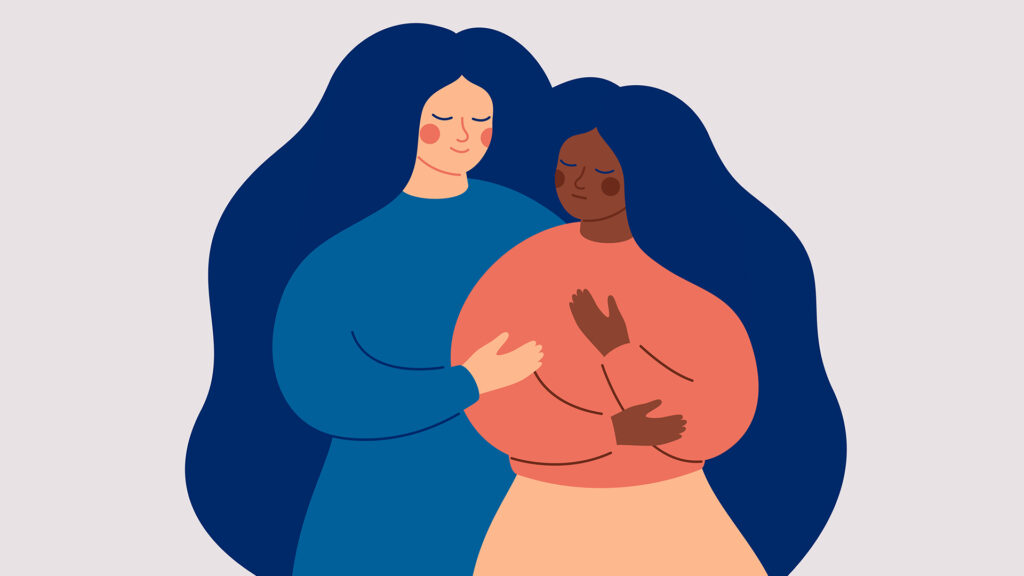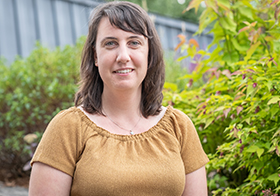Let’s talk about miscarriage

Having read the EDI blogs, I have been inspired by the brave people sharing their stories. Increasing the conversation on these difficult topics is the first step towards acceptance within our workplace.
To add to the dialogue, I would like to share my experience with miscarriage, specifically early miscarriage. I have experienced three early miscarriages, which all took place in 2020: at 11 weeks, 7 weeks and 8 weeks of pregnancy.
On each occasion, the miscarriage happened overnight at home but during a normal working week. Each time I continued to go to work, feeling like this was my failure to deal with and I should not let it impact my job. The more times this has happened, the more I now realise this wasn’t a healthy approach. Miscarriage is physically and mentally draining, it’s okay to not be okay.

To set the scene, I am a Senior Lecturer in the School of Design and Creative Arts. I love my job and work hard at it. I started work at Loughborough in 2016, first as a Research Associate then as a Lecturer from 2018. I have a daughter who was born in 2017 following a smooth pregnancy. In 2019 we decided it was the right time for a second child. I had no worries, I assumed that this pregnancy would follow the same path as my previous pregnancy.
Then in January 2020, three days before my 12-week scan I woke up to contractions with my pregnancy leaking away from me. I was not prepared for the physical and mental toll this would take on me. This was nothing like television and film had led me to expect. While I knew a couple of women who had had a miscarriage, they were not close friends so I had no ‘real world’ experience. The media portrayal of it had lulled me into a belief that miscarriage was quick and relatively pain-free. This is a huge injustice to the reality that many women face. Had I not already given birth, I would have said those contractions were the most pain I have ever experienced. The contractions were sporadic but continued for four days. Although at the time I didn’t know it, the bleeding would continue for more than two and a half months.
Despite the huge physical toll on my body and the mental anguish, I told almost no one at work. I managed my workload by delegating to people I line manage (I did not tell my manager). I felt like this was my problem, my failure and therefore I was responsible to manage work to continue to achieve. I reorganised my week to avoid needing to attend in-person meetings and continued to work from home. Other than taking time off to go to the hospital for a confirmation scan, I was at work. This quote from Boncori & Smith (2019) reflects my experience of my first miscarriage:
“There is no workplace for mourning a life that never was in today’s female academic lives. My own mother’s life suspended in the Intensive Care Unit timeless space was only worth ten days of my work life – that’s all one can take off from a job that owns your soul, your time, your marriage, your children. One simply must get on with it, contribute, and always be excellent. Nobody speaks of miscarriages in academia, they are painful secrets locked behind self-reporting sick leave forms and shut office doors; masked as flu, research leave, personal development time. But not as easy to recover from, I fear.” – Boncori & Smith 2019
In Leicestershire, to confirm a miscarriage it is first necessary to get a GP appointment and then the GP can get you a referral to the Early Pregnancy Assessment Unit (EPAU) who undertake a scan to confirm that there is or is not a pregnancy. From the GP phoning it is usually two to three days before an appointment can be made. This is the worst time, as it is a period of uncertainty. My second miscarriage in July 2020 started on a Saturday, so by the time I got a GP appointment on the Monday and then got an EPAU appointment the “product of pregnancy” as it is called, had all passed. This led to many hospital appointments because the EPAU could not be sure whether I had a miscarriage or if I was having an ectopic pregnancy. Three weeks of regular blood tests later, they confirmed that it was not an ectopic pregnancy. My third miscarriage was in December 2020 and although my second and third miscarriages did not carry the same level of intense physical pain or duration as my first one, the impact they had on my mental wellbeing was shattering.
A big change over the course of repeat miscarriage was my mental resilience. It deteriorated each time, as did my connection with the Boncori & Smith quote. By the time I had my third experience of pregnancy, starting with excitement, followed by fear of loss, followed by the devastation of miscarriage, I had no ability to carry on with work as normal.
After my third miscarriage, I told everyone I was likely to encounter at work what was happening and asked them to be patient and understanding with me. I was not prepared for the response. In being open about my experience, others were open with me about theirs. It turned out that many people I work with have suffered their own pregnancy loss or experienced a close friend going through similar. I put in a lot of effort to create a workplace persona of control. Miscarriage does not fit this image, it felt at odds with who I am at work. But the repeat experience meant I was no longer able to keep my home life separate from my work life and maintain my work persona, but it turned out I didn’t have to. I appreciate that everyone’s work environment is slightly different, but for me, my colleagues were so supportive. I was still consumed and preoccupied with the physical and mental drain of my loss, but this time I was supported at work and didn’t feel an added pressure of having to pretend I was okay.
The longer it has been since my last miscarriage the more open I have become about it and the more I ask myself: “Why does nobody speak of miscarriages in academia?”.
1 in 8 pregnancies end in miscarriage, so it is not surprising that it turned out I knew so many people with this experience. What is surprising is why didn’t I know? Within higher education we all work so hard so perhaps like me, others feel it is not possible to show weakness and vulnerability whilst also being successful at work. This is the joy of the EDI blog, as it is a place to share experiences and recognise that we are all human.
Miscarriage happens and it takes time to recover. Part of the problem is not knowing what to do about it – feeling alone at work whilst also feeling empty at home. The feeling of sadness is all-consuming. A supportive workplace structure eases the pressure. But we have further to go; University policy on miscarriage absence needs to be clearly communicated if people are to feel supported in reporting in sick. If you do report in sick for miscarriage this would be done in the usual method of self-certified absence, however, in my case, a request was sent for evidence of a doctor’s appointment at first reporting. The only evidence I had available was the scan result confirming non-pregnancy status. This is a very personal document and was emotionally hard to give to work. In New Zealand, there is an entitlement of three days paid bereavement leave for mothers and their partners following a miscarriage, allowing some initial time to focus on recovery.
I am now pregnant again and very much hoping to have a baby in February 2022. But I carry with me the experience of prior miscarriage. Rather than it being an experience of joy and excitement that my first pregnancy was, this one is a constant worry that miscarriage may occur again. I no longer trust my body.
It hurts every time I am asked “Is this your first pregnancy?”, and I reply “No, it’s my fifth pregnancy, I have one child”. The mental toll of repeated miscarriage is huge. In my opinion, it has had a bigger impact on my career than my maternity leave with my daughter.
For me, although I have been at work all the way through my miscarriages, I have not been working at a capacity I was able to before. The mental load reduces my energy to go above and beyond the necessary. For me, that has meant grant applications and journal paper writing have been shelved. I don’t know how long this will take to recover from.
So, I’d like to conclude with this final point. Let’s talk about miscarriage. Let’s not hide it away as a taboo subject. It is very likely that you know someone who has had a miscarriage. In the high paced work of academia many feel they are not able to pause to deal with their loss, so let’s challenge that. We put huge pressure on ourselves to keep going. I hope that by talking about miscarriage it will become normalised and we won’t feel ashamed or unable to take time out if we need to.
And if anyone is seeking support for pregnancy loss, I recommend the local charity Jakin. They have helped me a lot with managing my anxiety and concerns about my current pregnancy.
Dr Ashleigh Filtness
Senior Lecturer of Human Factors in Transport Safety, School of Design and Creative Arts
Boncori, I., & Smith, C. (2019). I lost my baby today: Embodied writing and learning in organizations. Management Learning, 50(1), 74-86.
Equity, Diversity and Inclusion
Reflections, comments, discussion and opinion on EDI topics from Loughborough University staff and students
Join the discussion
1 Comment
Rachel Third
Thank you for sharing your experience Ashleigh, and for the kind and graceful way you’ve written about this often hard-to-discuss area of life. It’s incredible helpful.